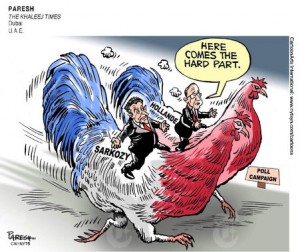
France is voting in the first round of a presidential election expected to show a groundswell of support for the far left and extreme right.
Nicolas Sarkozy, seeking a second five-year term in the Elysée palace, spent the final days of a bitter campaign insisting he could overhaul a widening deficit in opinion polls and catch François Hollande, the Socialist challenger, in the two-stage race.
Polling stations open at 8am on Sunday morning and will close at 4pm, except in larger cities, where they will remain open until 8pm.
The two rivals are expected to proceed to a run-off a fortnight after Sunday’s initial 10-way race but the showing of second-tier candidates in the first round will be crucial in determining how the frontrunners pitch their campaigns from here on.
At a final rally in the southern city of Nice on Friday, a visibly emotional Mr Sarkozy declared he was he having to fight his campaign “with a force I have never before expressed and with an absolutely unbreakable desire”.
With the lowest end-of-term ratings of any president since the 1950s, pollsters predict Mr Sarkozy will succumb to the same fate as the Italian, Greek, Spanish, Portuguese and Irish leaders who have been swept from office since the start of the eurozone crisis.
That unpopularity has been a gift to Mr Holland, who is bidding to become the first Socialist to rule France in 17 years – and only the second since the foundation of the Fifth Republic in 1958.
If his own first-round tally plus those of the other leftwing candidates approaches 50 per cent, Mr Hollande will feel confident that he can clinch the run-off.
A product of the elite French university that has groomed many a future political leader, Mr Hollande has served in the highest ranks of the Socialist party but has never held ministerial office.
If the polls are to be believed, his low-risk campaign and preference for boosting growth over slashing public spending have paid off.
An Ipsos poll published on Friday, the last day of campaigning, showed Mr Hollande’s lead of 3.5 percentage points in the first round widening to a commanding 12-point advantage over Mr Sarkozy in the run-off.
However, the same poll also suggested that 28 per cent of voters – equivalent to 12.5m people – were still undecided. Mr Sarkozy has predicted that a “new phase” of the contest will begin after the first round.
The victor will inherit a nuclear-armed nation whose standing on the world stage has burgeoned under Mr Sarkozy but whose debt-laden economy is under strain and whose national conscience underwent a severe examination when a young gunman embarked on a killing spree in Toulouse last month.
Initial official results are due to be announced shortly after the last polling booths close. Media are prohibited from reporting unofficial tallies before then.
All eyes will be on three second-tier candidates, each of whom hopes that a strong showing would allow them to extract concessions from the frontrunners in exchange for support in the run-off.
Mr Hollande has already courted backers of Jean-Luc Mélenchon, candidate of the Left Front, with a hint he might raise the minimum wage.
Mr Mélenchon, whose electrifying rallies have made him the surprise star of the campaign, has urged voters to “strike at the Merkozy axis” by unseating Mr Sarkozy, who along with Germany’s Angela Merkel has been the chief architect of the eurozone’s crisis response of austerity and bailouts.
But the firebrand former teacher has also urged his supporters to back him in the first round in order to “raise the demands of the left”, an apparent reference to further concessions he would hope to wring from Mr Hollande.
Marine Le Pen of the National Front has drawn Mr Sarkozy to the right with her denunciations of immigration. But she has also, like her counterpart on the far left, tapped disenchantment with the mainstream political elite, dubbing the frontrunners “Siamese twins”.
Ms Le Pen and Mr Mélenchon are vying to secure third place in the first round, each polling in the mid-teens.
The potential kingmaker is François Bayrou, who is forecast to come fifth with about 10 per cent support.
Mr Sarkozy has pointedly declined to contradict suggestions that Mr Bayrou might be offered the premiership in a second Sarkozy administration – though it is far from clear that Bayrou supporters would be inclined to back the president
Financial Times

Leave a Reply
You must be logged in to post a comment.